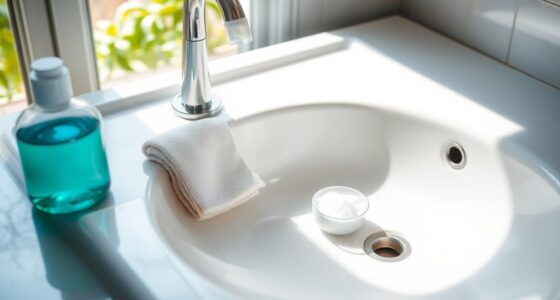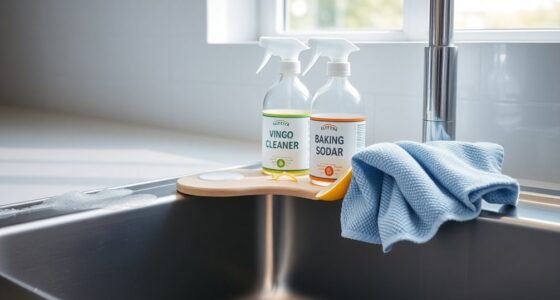Regular HVAC maintenance is key to keeping your AC and furnace running smoothly. Schedule professional duct cleaning every few years to remove dust, mold, and debris that can clog systems and reduce airflow. This prevents strain on your equipment, improves indoor air quality, and enhances efficiency. Replacing filters regularly supports system performance and saves money. Staying on top of these simple tasks helps you avoid costly repairs and ensures your home stays comfortable—discover more tips to keep your systems in top shape.
Key Takeaways
- Schedule regular professional HVAC inspections and cleanings every few years to ensure system efficiency and indoor air quality.
- Replace or clean filters regularly to prevent debris buildup and extend equipment lifespan.
- Keep outdoor units free of debris, such as leaves and dirt, to maintain proper airflow.
- Monitor system performance and address issues like strange noises or uneven heating/cooling promptly.
- Use programmable thermostats and adjust settings seasonally to optimize energy use and system longevity.

In addition to replacing filters, duct cleaning plays a critical role in maintaining your system’s efficiency. Over time, dust, dirt, pet dander, and even mold can accumulate inside your ductwork. When ducts are clogged or dirty, your HVAC system has to work harder to push air through the system, which reduces efficiency and increases energy costs. Duct cleaning removes these obstructions, allowing for better airflow and more consistent temperature control throughout your home. It also improves indoor air quality by reducing the allergens and pollutants circulating in your living space. While duct cleaning isn’t a daily task, scheduling professional cleaning every few years, especially if you notice excessive dust or suspect mold, can greatly enhance your system’s performance. Properly maintained ductwork can also prevent airflow restrictions, which directly impact energy consumption and system longevity. Additionally, well-maintained duct systems help prevent the buildup of debris that could cause system strain, leading to costly repairs. Regular inspections can also identify early signs of mold growth, helping you address issues before they become significant problems. Plus, clean ducts help ensure that your filters are not overwhelmed by debris, extending their lifespan and reducing the frequency of replacements.
Frequently Asked Questions
How Often Should I Replace My HVAC Filters?
You should replace your air filter regularly to guarantee ideal airflow and air quality. The filter replacement schedule depends on your filter’s lifespan, typically every 1 to 3 months. Factors like pets, allergies, and usage can shorten this interval. Check your filter monthly, and if it looks dirty or clogged, replace it sooner. Staying on top of your filter replacement schedule keeps your HVAC system running efficiently and improves indoor air quality.
Can DIY HVAC Maintenance Cause Damage?
You might cause damage if you try DIY HVAC maintenance without proper knowledge. Incorrectly handling system calibration or refrigerant leaks can lead to system inefficiency or damage. You could also misdiagnose issues, resulting in costly repairs. Always follow manufacturer instructions and consider consulting a professional for complex tasks. This way, you prevent potential harm and guarantee your system runs smoothly and efficiently.
What Are Signs My HVAC Needs Professional Help?
Imagine your comfort slipping away like grains of sand. If your HVAC system struggles to maintain temperature, makes strange noises, or has poor airflow, it’s time for help. Signs include inconsistent heating or cooling, increased energy bills, and strange odors. A professional can perform system calibration and ventilation optimization to restore efficiency. Don’t wait until small issues become costly repairs—trust experts to keep your home cozy and safe.
How Does Humidity Affect HVAC Performance?
Humidity impacts your HVAC performance by affecting moisture levels in your home. When humidity is too high, your system works harder to control moisture, leading to inefficiency and increased energy use. Conversely, low humidity can cause discomfort and dry air. Proper humidity control helps your HVAC operate smoothly, saving energy and maintaining comfort. Monitoring and managing moisture levels guarantees your system runs effectively and prevents issues caused by improper humidity.
Are Eco-Friendly Refrigerants Better for My System?
Like a revitalizing gust, eco-friendly refrigerant types are better for your system and the planet. They usually have a lower environmental impact compared to traditional options, reducing greenhouse gases. While they may sometimes cost more upfront, they’re safer and more sustainable long-term. Choosing eco-friendly refrigerants helps protect the environment and ensures your HVAC system runs efficiently, making it a smart choice for both your comfort and the planet.
Conclusion
By staying on top of your HVAC maintenance, you’re like a skilled captain steering your home’s comfort through the changing seasons. Regular check-ups and simple upkeep keep your AC and furnace running smoothly, preventing costly breakdowns. Think of your system as a well-tuned instrument—when you care for it, everything plays in harmony. So, don’t wait for a cold snap or heatwave; maintain your HVAC now to enjoy peace of mind all year round.









